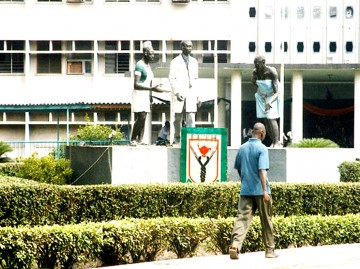Following reports revealed by the Socio-Economic Rights and Accountability Project (SERAP) on the “humanitarian crisis, manifestations of corruption and mismanagement at the Lagos University Teaching Hospital, (LUTH) Idi Araba, nurses have told their own side of the story.
The report further read “Another nurse told SERAP, ‘The infant incubator or neonatal incubator is a rigid box-like enclosure in which an infant can be kept in a controlled environment for observation and care. Some of the incubators in LUTH are not working. It is either the heater is bad, or the monitoring mechanisms are not working. The incubators available in LUTH have been in use for over 15 years.’”
“A nurse, who has worked for four years in LUTH spoke to our researchers: ‘Some beds in different wards are too old to still be in use, but LUTH knows how to manage. Some of the available beds have become dilapidated. Some beds can cause accidents. They have beds from which patients can fall. It has really happened, and I’ve seen it happen. But they keep managing.’”
“Another medical staff said, ‘Even bed sheets are in short supply. Patients use their wrapper for bed sheets sometimes. And when they use LUTH bed sheets, they are usually old and torn most of the time. Toilets in LUTH are centres of disease distribution. You can be sure to get urinary tract infections and the like. I am referring to the toilets in different wards.’”
“According to a senior doctor who spoke to SERAP, ‘There is poor water supply in LUTH and water is supposed to be an essential commodity, especially in a hospital. It’s deplorable to the extent that water does not run in the taps. You are seeing LUTH’s flowers and wall paints, but it is rotten inside. I will be right to say things are not working optimally in LUTH.’”
“At all the three study sites, derelict and obsolete equipment were commonplace. Most wheelchairs in LUTH are stiff and old. They are not in optimal condition. There is a poor maintenance culture. Not even the lifts are working well. One can easily get stuck in an elevator; so it is better to use the staircases. The lift in E Block is bad to the extent that they got a man to manually operate the lift when people enter and are in transit. It doesn’t even have doors anymore.”
“LUTH has its own laboratories but the doctors their prefer to refer patients to the private laboratory because private lab are considered to be more efficient and delivered results quicker.”
“16-year-old Ngozi Eze (not the real name), who was diagnosed with stomach obstruction and was referred to LUTH for an urgent surgery to avoid complications, shared his experience: ‘When we got to LUTH, we were told there was no bed in the general ward. We were referred to the VIP section and they said I would have to wait for about three weeks before the surgery could be done, because such surgeries are pre-booked; this was despite that my condition was critical. At the end of the day, we had no choice but to return to a private hospital where the surgery was eventually done.’”
“Another nurse at LUTH said, ‘The facilities are overstretched. To see a specialist on clinic days you have to leave your home by 4am or 5am to be at LUTH by 6.30am to join the queue early. Even at that, there are no guarantees you will be attended to.’”
“Nurses are forced to pick and choose patients to attend to. The ideal World Health Organisation (WHO) standard is five nurses to one patient. In LUTH it’s two nurses to 30 patients. In each ward, there are about 30 patients, and there are only about four nurses for each shift. In the afternoon, there’ll be two nurses, and in the night, there’ll be two nurses.”
“People are dying in service, they are not being replaced; people are resigning, they are not being replaced; people are retiring, they are not being replaced; people are leaving for greener pasture outside Nigeria, they are not being replaced. So, it has cut down the number of professionals that ought to be rendering health care service. And this has also made the management of this hospital (LUTH) to be employing professionals on a casual basis, which is actually against the provisions of the law.”
“Another senior medical officer at LUTH said, ‘LUTH is like a dumping ground for health care in Lagos. It’s usually the extreme cases that are brought to LUTH after treatment elsewhere has failed. Even if you’re rushed in as an emergency case, it’s not guaranteed that you’ll be attended to. Sometimes they’ll tell you there are no available beds unless you can afford the VIP section. LUTH is supposed to be the last hope of the common man in terms of health care. Once you come here, you’re expected to get answers. Sometimes you get answers. But there are a whole lot of challenges. Government is not paying attention to the health sector.’”
The report continued “Another nurse said, ‘There are patients that need to be bathed in the morning with hot water because they cannot help themselves. But there will be no hot water; so, we use cold water to bath them. Is it not when there is electricity that the heater will work? That is if there is heat. And you have to bathe the patient because you’re closing for the day. So, what do you do? The generators are not working.’ Sometimes, in the night, there is no light in the wards. Nurses sometimes use torchlight to attend to patients. LUTH electricity just recently improved, still electricity supply is epileptic. It’s still bad but it was worse. Before, there was no electricity at all day and night.’”
Other testimonies gathered for the report read in part “This is a machine designed to move breathable air into and out of the lungs, to provide breathing for a patient who is physically unable to breathe or breathing insufficiently. When a patient cannot breathe anymore because the lungs are not functioning, the ventilator is used to aid artificial breathing. It’s only available in a few hospitals. As big as LUTH is, there is none. The state of health care in LUTH is deplorable.”
“At Igbobi, no money, no treatment. Admission at Igbobi’s casualty ward is N5,000 per day. After the preliminary examination, tests and eventual diagnosis, patients must pay before they could be admitted into the appropriate ward for their conditions.”
“Patients get their syringes and needles, gloves, without it the doctor will not touch the patient. If they ask you for it and you don’t have it, they just walk away, they don’t have time. Privatization of laboratories is another ill that the National Orthopaedic Hospital, Igbobi, has in common with LUTH.”
“We don’t have a therapeutic swimming pool at Igbobi. We used to have long time ago, but it is now filled up; you won’t even recognize the site of the swimming pool now when you get there. And these are the basic simple tools that increase output. No matter how skillful you are, when you don’t have tools to work with, you cannot optimize your output.”

 Join Daily Trust WhatsApp Community For Quick Access To News and Happenings Around You.
Join Daily Trust WhatsApp Community For Quick Access To News and Happenings Around You.


